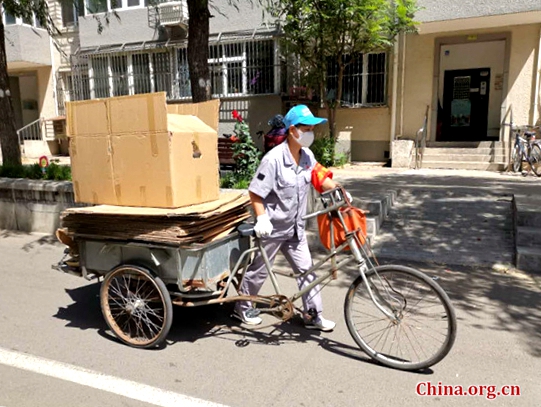Garbage collectors enforce rubbish sorting in Beijing
- By Wu Jin
 0 Comment(s)
0 Comment(s) Print
Print E-mail China.org.cn, May 29, 2020
E-mail China.org.cn, May 29, 2020

At the break of dawn, Guo Jingliang, who dresses neatly in his grey uniform, embarks for his day's work as a local garbage collector.
Guo is from China's northeastern Heilongjiang province. Each day, he cleans rubbish cans, collects residual waste and packs them all into his electric cart at a community in Beijing's Haidian district. However, since the city introduced new rubbish sorting rules, Guo has had to adapt.
At the beginning of May, all communities in the Haidian district were instructed to begin dividing daily waste into food, residual, recyclable and hazardous categories in response to the city's environmental protection and energy-saving agenda.
At 7:00 am, Guo rides his cart, running against the rush hour traffic, to a garage a few blocks away. At the station a long queue of carts wait to drop their waste into two bulky blue containers that lay open beneath the floor.
When it comes to Guo's turn, he swaps his sneakers for a pair of rubber black boots before grabbing a shovel to press the rubbish as tight as he can.
Once the rubbish is completely compacted, the station operator will seal and wheel the container onto a truck that heads there each morning to transport the waste. According to the operator, the residual waste that the station receives each day averages around 20 tons.
Meanwhile, inside the community, Guo's wife Guan Xiuhong stands beside the waste cans assisting people to jettison their rubbish into correct bins.
According to Guan, guiding people to throw rubbish into the correct bin is both meaningful and challenging.
"Most residents are gradually becoming accustomed to the regulations. However, there are still someone who remain disgruntling about the sorting and question the way we work," Guan said.
To better facilitate the rubbish sorting policy, the aforementioned community have moved the waste bins beside the main gate where there are two video cameras that can monitor the whole process.
According to Chen Xiao, a teacher of Chinese and resident of the community, the garbage collectors' workload has intensified since the implementation of the new rules.
"Every time they were confronted or complained to while helping people understand the sorting rules, they chose to respond in silence, because they knew that it takes time for people to cultivate a habit," Chen said.
His remark were echoed by Zhang Yuemei, the manager of the community's property department.
"In some other countries people have taken 10 to 20 years to become accustomed to dividing waste. Now our country has started the same program, which also needs a process during which perseverance will play an essential role," she added.
Rubbish sorting is an example of a community-level practice that will help the country's commitment to protecting the blue skies, clear waters and clean lands, according to this year's government work report delivered by Premier Li Keqiang at the Third Session of the 13th National People's Congress on May 22.






Go to Forum >>0 Comment(s)